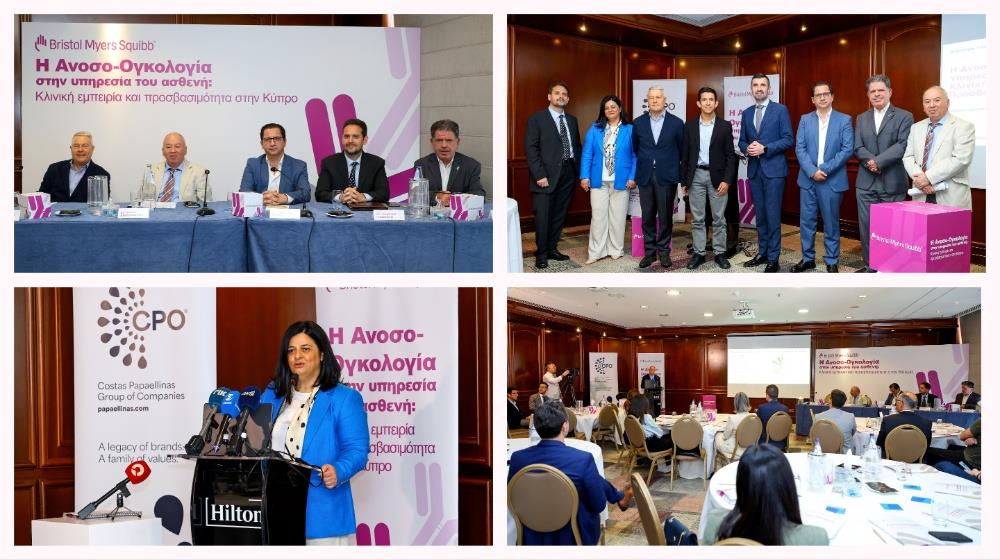Bristol Myers Squibb (BMS), a leading biopharmaceutical company with a dominant position in immuno-oncology, held a press conference in Cyprus.
Distinguished oncologists and pathologists discussed the importance of utilising innovative immuno-oncology treatments to improve cancer care and the necessity of ensuring timely access to these innovative therapies. The event was moderated by Eleni Dimitriou, Director of the Oncology Department of BMS Greece and Cyprus.
Despite approximately 4,600 new cancer cases being diagnosed annually in Cyprus, mortality rates remain relatively low compared to the European Union. According to the OECD, this is attributed to the increasing effectiveness of innovative therapies, which contribute to prolonging and improving patients’ quality of life.
Giorgos Tsiakalakis, Director of Market Access & Corporate Affairs at BMS Greece & Cyprus, highlighted BMS’s impact on cancer treatment, stating:
“Bristol Myers Squibb is working with a vision to revolutionise cancer treatment through innovative immuno-oncology therapies. It is a promise to improve human health and an investment in saving precious resources for the prosperity of every country. Inspired by the achievements of immuno-oncology, we are optimistic that through continuous collaboration among the scientific community, the State, and social partners, we will establish a modern and sustainable oncology care system that increases patient survival and reduces the financial burden on both patients and the healthcare system.”
Dr. Georgios Tsironis, Pathologist-Oncologist at the Bank of Cyprus Oncology Center, emphasised the critical importance of early cancer diagnosis and highlighted the benefits of screening programmes and regular medical checkups, which increase the chances of successful treatment and reduce the need for aggressive therapies. He cited low-dose CT scans for high-risk lung cancer patients as an example.
Dr. Charis Charalambous, Clinical Oncologist at the Bank of Cyprus Oncology Center, spoke about immunotherapy for lung cancer, its challenges, and scientific developments. He noted that innovative immunotherapies have tripled survival rates in non-small cell lung cancer compared to traditional treatments and added that targeted therapies have opened new avenues for lung cancer treatment.
Regarding gastrointestinal cancers, Dr. Dimitris Papamichael, Director of Medical Oncology at the Bank of Cyprus Oncology Center, described the significant evolution of treatments over the past five decades. He stressed that immunotherapy has radically changed the treatment landscape, offering substantial survival benefits and solutions for diseases that were previously difficult to treat.
Dr. Georgios Astras, Pathologist-Oncologist and Professor of Oncology at the European University, spoke about a tenfold increase in five-year survival for melanoma patients due to immuno-oncology. He mentioned that melanoma served as the launching point for the development of immuno-oncology 15 years ago, and that new drug combinations now offer significant therapeutic options.
Dr. Georgios Ioannidis, Pathologist-Oncologist and Director of the Oncology Department at Nicosia General Hospital, underscored the importance of adhering to international and local treatment guidelines. He noted that these guidelines ensure minimized risks and side effects, improved patient quality of life, standardized care practices, cost containment, informed decision-making, and the continuous updating of knowledge, helping healthcare professionals make evidence-based decisions regarding diagnosis, staging, and treatment options.
Marios Kouloumas, Honorary President of the Cyprus Federation of Patient Associations, shared his personal experience and the federation’s long-standing efforts to advocate for patient rights. He emphasized the need for unhindered access to innovative treatments that change the therapeutic management and treatment of serious, chronic, and rare diseases. Despite being diagnosed with a chronic condition at a young age, he dedicated 23 years to the patient movement, contributing to the implementation of the GHS (General Healthcare System), a historic social reform for Cyprus.









